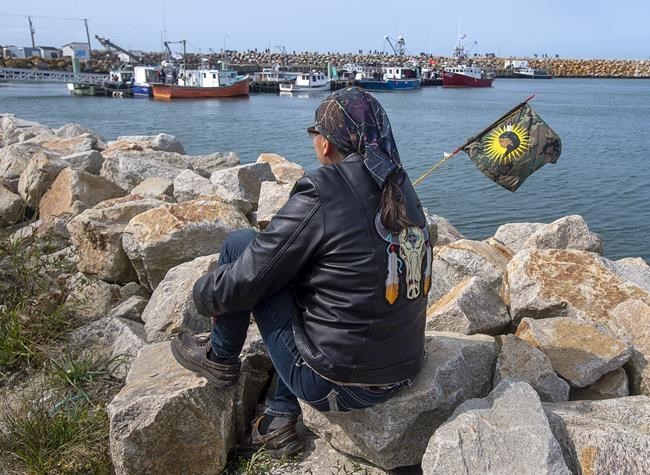
Members of the Sipekne'katik First Nation prepare to go fishing in Saulnierville, N.S., as it launches its own self-regulated fishery on Thursday, Sept. 17, 2020. A trio of Mi'kmaq Parliamentarians says Ottawa should create a co-managed Indigenous fishery off Nova Scotia as a long-term solution to tense conflicts between First Nations and non-Indigenous fishers in the lobster harvest. THE CANADIAN PRESS/Andrew Vaughan
Republished October 01, 2020 - 5:52 AM
Original Publication Date October 01, 2020 - 1:06 AM
HALIFAX - Three Mi'kmaq parliamentarians say Ottawa should create a co-managed Indigenous fishery off Nova Scotia as a long-term solution to conflicts between First Nations and non-Indigenous fishers in the lobster harvest.
The proposal comes from Sen. Dan Christmas, a former chief of the Membertou First Nation in Cape Breton, Sen. Brian Francis, of Abegweit First Nation in Prince Edward Island and Jaime Battiste, a Liberal MP from Nova Scotia.
Christmas said in an interview this week the trio held discussions last Friday with Fisheries Minister Bernadette Jordan and Indigenous Relations Minister Carolyn Bennett to push their proposal.
The effort comes amid the launches of multiple Mi'kmaq lobster fisheries, each tied to the 1999 Supreme Court of Canada decision stating Donald Marshall Jr. had a treaty right to fish for eels when and where he wanted, without a licence.
The Marshall decision said the Mi'kmaq, Maliseet and Passamaquoddy bands could hunt, fish and gather to earn a "moderate livelihood,'' though the court followed up with a clarification two months later, saying the treaty right was subject to federal regulation for conservation purposes.
The Sipekne'katik First Nation opened their lobster fishery in St. Marys Bay last month, provoking criticisms from non-Indigenous fishers who argue fishing outside of the normal season violates federal rules — and the second part of the Marshall decision.
The Sipekne'katik fleet includes 10 boats with 50 traps each, which is equivalent to the catch of about two of the roughly 944 commercial lobster licences granted to non-Indigenous harvesters in the area.
Meanwhile, Mi'kmaq lobster harvesters from the Potlotek First Nation in Cape Breton were planning on taking to the water in St. Peters Bay on Thursday under their own fishing plan, outside of the regular commercial season.
Christmas said the Mi'kmaq leadership is largely dissatisfied with the current federal Fisheries Department method of seeking individual deals with bands.
"The current path isn't working after 21 years of waiting for action and the last three years of negotiations," the senator said.
The Mi'kmaq leaders point to the successful implementation of a co-managed education system in the province adopted by 12 of 13 of the Mi'kmaq First Nations as a model.
"We've governed our own education system for 25 years, and we think developing a similar model for the fishery would have equal success," Christmas said. He also argues that talks on the fishery issue should shift from the federal Fisheries Department to Indigenous Relations, under Bennett's leadership.
Meanwhile, Battiste's office posted a letter signed by the three Mi'kmaq parliamentarians saying they favour an "Atlantic First Nations Fisheries Authority" to oversee their moderate livelihood fishery.
Neither minister was available for comment on the proposal.
However, a spokesman for a group of commercial, non-Indigenous fishers in western Nova Scotia says Mi'kmaq leaders need to recognize the Marshall decision clearly refers to the federal Fisheries Department as the regulator of the resource.
Colin Sproul, president of the Bay of Fundy Inshore Fishermen's Association, said the Supreme Court was unambiguous, citing it from memory.
The November 1999 clarification by the court said: "The paramount regulatory objective is conservation, and the responsibility for it is placed squarely on the minister responsible and not on the Aboriginal or non-Aboriginal users of the resource."
Sproul said he is calling, "for two-way respect for the decision."
Still, Christmas said he remains convinced the creation of a co-managed Mi'kmaq fishery, where Indigenous communities have oversight of a moderate livelihood fishery, will eventually be seen as the wisest way forward.
"If we try a different approach, a different model we'd be able to solve these problems and get some certainty on the water," he said.
This report by The Canadian Press was first published Oct. 1, 2020.
News from © The Canadian Press, 2020